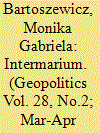| Srl | Item |
| 1 |
ID:
189393


|
|
|
|
|
| Summary/Abstract |
The Three Seas Initiative was launched in 2015 by Croatia and Poland; today, it brings together 12 European states located in the Adriatic, Baltic, and Black Seas basins. To understand the rationale behind this seemingly precarious regional project, this paper employs the optics of critical geopolitics, which shifts the focus away from the exclusive concerns of great powers machinations, counters the dominant narrative by emphasising the multiplicity of voices in the geopolitical spectrum and stresses the emancipatory nature of the whole project balanced by its heterarchical characteristic. This angle allows us to capture the full complexity of this geopolitical design characterised by two phenomena: ‘being in between’ (monolithic powers, areas of domination, or at least domination, one religion and one language) and ‘fragmentation and multinationality’. The analysis demonstrates that Intermarium is an attempt to break away from everything that prevents the region ‘between Berlin and Moscow’ from being a subject, not an object of political affairs, and shows how Central and Eastern Europe fits into the post-liberal international order.
|
|
|
|
|
|
|
|
|
|
|
|
|
|
|
|
| 2 |
ID:
173167


|
|
|
|
|
| Summary/Abstract |
The recent rise in the defence budgets among the NATO members reawakens the free-riding dilemma. This article provides an analysis of the defence spending of two new member states, the Czech Republic and Lithuania. Based on the free-riding theory, we explain why some of the new NATO members decide to increase their defence budgets (Lithuania), and others do not (Czech Republic). In contrast to the majority of works which focus either on the US as the biggest spender or on the “old” members of the Alliance, we explain under what circumstances some of the small European states who became new NATO members started to increase their defence budgets even though they do not have to, and the literature suggests that free-riding is easier. In the process, we identify three crucial factors that influence the decision-making process in this regard: the level of threat perception, economic situation, and the US pressure.
|
|
|
|
|
|
|
|
|
|
|
|
|
|
|
|